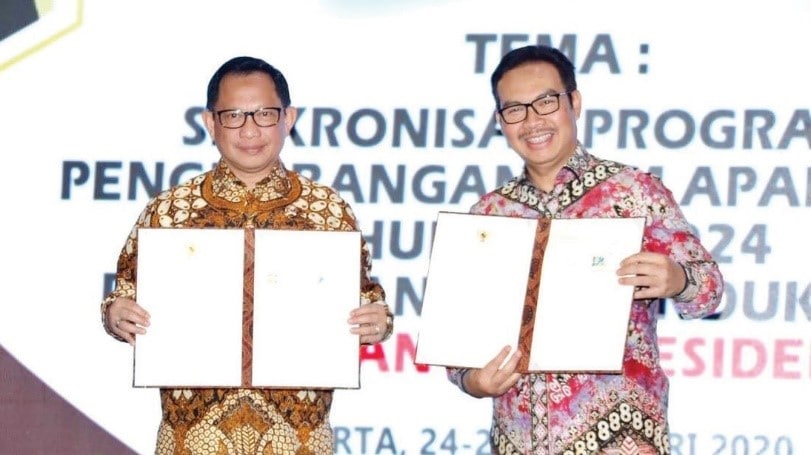Population issue, growth and job creation receives special attention from the Minister of Home Affairs, Tito Karnavian.

“Population issue is a long-term problem. A population growth which does not followed by job creation will pose a national problem.” Those are a couple of points emphasized by the Minister of Home Affairs, Tito Karnavian, in his remarks when opening the 2020 National Coordination Meeting (Rakornas) of Human Resources Development Department within the Ministry of Home Affairs in Jakarta recently. At that meeting, the Ministry of Home Affairs and BKKBN signed a Memorandum of Understanding (MoU). The MoU is a landmark for BKKBN, including for front liners in gathering commitment and coordination between regional/sub-national government and stakeholders.
The goal of this partnership between BKKBN and Ministry of Home of Affairs is to accelerate in achieving balanced population development and quality family. In order to achieve those common goals, Tito Karnavian puts his hopes on demographic bonus that Indonesia can benefit to boost investments.
Tito mentioned, without any intention for comparison, that currently advanced countries are no longer prioritising on number or quantity of children, but rather on the quality of children and families. Therefore, now those countries are facing “aging population”.
Furthermore, Tito stated that the program developed by BKKBN is very strategic in advancing this country onwards. BKKBN can actively participate in combating stunting cases together with other relevant ministries/institutions.
Strengthening Bangga Kencana Program
Meanwhile, the head of BKKBN, dr. Hasto Wardoyo hopes the MoU spirit between Ministry of Home Affairs and BKKBN can strengthen the implementation of Family Development program, Population program, Family Planning (Bangga Kencana) program at operational levels, which are district levels, cities and so on.
“Hopefully this MoU can inspire the strengthening of Bangga Kencana program institutionalization in all districts and cities; can encourage the funding of Bangga Kencana program that is integrated with the national budget (APBN), regional budget (APBD) and private sector support/assistance”.
“Including maximising the task and function of Family Planning field staff (PKB/PLKB) on the ground by the regional government,” Hasto added.
The Law No.23 of 2014 has bestowed the district and city governments to empower field (PKB/PLKB) staff.
Furthermore, Hasto hoped that through this cooperation there would be in-line and synchronize Bangga Kencana program policies between central government and district, city governments all the way to village and neighbourhood levels.
“We have almost 23,000 PKB/PLKB staff, approximately 1,2 million trained cadres and 5,700 Family Planning Centres at Sub-District level which hopefully could be fully utilize by the regional government to accelerate and equally distribute Bangga Kencana program services to the public,” said Hasto.
“More than 15,000 Kampoong KB are expected to become the push factor and government resource to integrate government programs, both on poverty eradication program in general, reducing stunting rate, significantly reducing pregnant women and birth delivery mortality rates and unmet-need rates,” Hasto added. (sara)